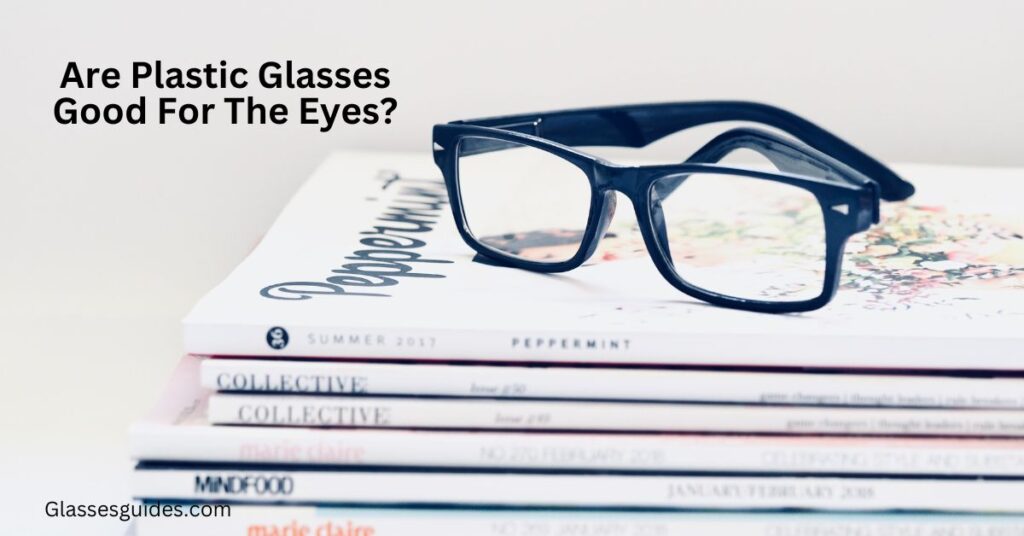Plastic glasses have surged in popularity as eyeglasses, prized for their durability and glare-reducing properties. But amidst the hype, the burning question remains: are plastic glasses truly beneficial for your eyes? Let’s explore the inner workings of plastic lenses to get the real story of how they affect eye health and clarity of vision.
Table of Contents
The main advantages of plastic lenses
Plastic lenses are incredibly resilient, withstanding the harshness of regular wear and tear. Plastic lenses are less likely to break when struck than their glass counterparts, which makes them a great option for people with busy lives or kids who might be more likely to have mishaps.
Because plastic lenses are so durable, kids and busy people find them to be especially appropriate. Plastic glasses ensure dependable eye protection without compromising comfort or style, giving parents and wearers alike piece of mind due to their resilience to knocks and bumps.
The fact that plastic lenses are less prone to glare issues than glass lenses is one of its main advantages. This function improves visual clarity, especially when driving or using digital screens—activities where glare can be distracting—or when one is in a setting with high lighting.
When made to exacting standards, plastic lenses are generally accepted as safe for vision correction. They are frequently used in corrective eyewear, and no serious side effects have been documented. Their popularity with both optometrists and wearers is highlighted by their dependability, providing comfort to people looking for a dependable way to improve their vision.
The prevalence of plastic lenses in corrective eyewear underscores their trustworthiness and effectiveness. With extensive usage and minimal reported issues, plastic lenses have established themselves as a staple in the vision correction industry. Their widespread adoption speaks to their reliability and suitability for addressing various vision impairments.
When manufactured with precision and attention to detail, plastic lenses deliver crisp and distortion-free vision. Their optical clarity ensures an uncompromised visual experience, allowing wearers to perceive the world with clarity and precision. Properly made plastic lenses uphold the integrity of the wearer’s vision, fostering optimal visual acuity and comfort.
Further reading: Metal Or Plastic Glasses: Which Frames Are Right For You?
Potential disadvantages and risks

Plastic lens safety is mostly dependent on how well they are made. Poor manufacturing techniques may jeopardize the lenses’ structural integrity and endanger eye health. For the lenses to satisfy strict safety requirements, meticulous attention to detail is essential during the manufacturing process.
Choosing inexpensive plastic lenses might occasionally have unforeseen repercussions. These less expensive options can include contaminants or leftover chemicals from the production process, which could be harmful to eye health. Purchasing better lenses reduces this risk and guarantees a safer visual experience.
Plastic lenses with poorly polished surfaces may distort images, impairing clarity and creating eye strain. The effectiveness of the eyewear as a whole may be diminished by polishing flaws that cause blurriness or aberrations in the wearer’s vision. Maintaining optical perfection in lens finishing requires close attention to detail.
Contrary to common assumptions, plastic lenses are not necessarily more secure than those made of glass. The particular kind of plastic used is one of several elements that affect how safe the materials used to make eyewear are. Certain plastics, like polycarbonate lenses for children’s eyewear, are more suited for particular uses than others in terms of impact resistance and durability.
The type of plastic used has a big impact on how healthy the eyes are. Different plastics have unique qualities that can impact durability, safety, and visual comfort. By being aware of these variations, one can choose eyewear with the best possible protection for one’s eyes and comfort for the wearer.
Children’s eyeglasses can benefit greatly from the superior impact resistance and lightweight nature of some plastics, such as polycarbonate. For young wearers, these materials provide increased protection and comfort, giving parents peace of mind about the health and safety of their children’s eyes.
Tips for choosing good plastic glasses
When choosing plastic lenses, give preference to well-known brands that are recognized for their dedication to excellence and innovation. Reputable producers use cutting edge materials and manufacturing processes to ensure outstanding optical clarity, longevity, and comfort for the wearer. Reliability and trustworthiness go hand in hand, providing comfort to consumers looking for premium eyewear options.
Invest in UV-blocking and anti-reflective plastic lens versions to extend their lifespan and improve performance. Anti-reflective coatings reduce reflections and glare, enhancing comfort and visual clarity, particularly in bright areas or when using digital devices. UV-blocking coatings improve general eye health by protecting your eyes from damaging UV rays and lowering the chance of long-term eye damage.
To select the best plastic lenses for your needs, you must speak with a skilled eye care specialist. Eye physicians are qualified to evaluate your lifestyle and eyesight, and they will suggest lenses based on your individual needs and preferences. Their advice guarantees the best possible vision correction, comfort, and security, enabling you to choose eyeglasses with knowledge.
Concluding
To sum up, plastic lenses have many benefits for vision correction, such as reduced glare, durability, and impact resistance. But it’s important to be mindful of possible drawbacks including variations in material quality and manufacturing quality. You can guarantee the best possible fit and security for your plastic eyeglasses by giving priority to reliable brands, choosing lenses with cutting-edge coatings, and consulting eye care specialists for advice. Recall that the secret to optimizing the advantages of plastic lenses is to make well-informed decisions that are specific to your needs and way of life.



